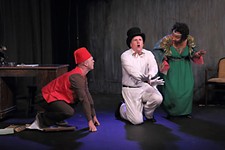Funnyhouse of a Negro
Adrienne Kennedy's Funnyhouse of a Negro is a bold, daring play, and Austin Community College and ProArts Collective have given it the bold, daring staging it deserves
Reviewed by Barry Pineo, Fri., March 2, 2007

Funnyhouse of a Negro
Gallery Theater, Austin Community College Rio Grande campus, through March 4
Running time: 50 min
Let me tell you a story. I was getting in line at a convenience store. The line was long. In front of me was a black man. A very dark-skinned black man. He had dreadlocks. He had a do-rag. He had a fistful of cash. I could see 50s and 20s. And as I noticed all this, as I took all this in, the first thought that popped into my head was, "He must be a drug dealer."
While I don't consider myself to be a racist, I am racist. Of course I am. I live in a racist culture. Racism has been embedded in me since I could first perceive the world. It's not rational. It's deeply and wholly psychological.
Adrienne Kennedy knew this when she wrote this play about a young black woman who doesn't want to be black. Sarah is the daughter of a light-skinned mother and a dark-skinned father. She believes her father raped her mother, and the result of that rape was her conception. It doesn't matter, of course, if her father actually raped her mother. What matters is what she believes, and as a result of her belief, she has come to hate her color, to hate herself, to hate the very skin that embodies her. She wishes to be more "pallid." She wishes to be more white.
Should you attend this Austin Community College and ProArts Collective co-production, the first of many annual February collaborations between the two that will benefit the Boyd Vance Scholarship Fund, you best watch your step. It's dark in ACC's Gallery Theater, and a woman in whiteface with a cross painted on her forehead wanders through the audience, twitching and grimacing, holding a mannequin's head and stroking its long black hair. Sitting on a throne behind a thin screen on designer Peter Sukovaty's blasted tenement of a set is a white-faced Queen Victoria, played with frightening and totally convincing intensity by Mikala Gibson. Shortly after the play begins, with much loud hammering and disembodied laughter, we meet the other characters, which include a crippled, gnomish Jesus, tongue lolling from his mouth, and Patrice Lumumba, barefoot and carrying an African mask. In very little time, it becomes clear that what we are watching is occurring inside Rachel's head. The race hatred she has internalized has become self-hatred. It is driving her insane, and we get to watch her dizzying descent into madness. There's nothing funny about this Funnyhouse. It's all too visceral and all too real. It's a bold, daring play, and director Marcus McQuirter and his group of totally committed actors have given it the bold, daring staging it deserves.
The first step in fighting racial prejudice is to speak out. Whenever and wherever it rears its ugly, irrational head. And sure, we've been talking about it for a long time, but it's still undeniably there, so we quite obviously haven't talked enough. They're talking about it over at ACC. You should open your ears and listen.
And by the way, when he saw I had only one item, that black man in the convenience store let me go ahead of him.










